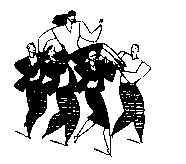
|
Fit
Facts |
AMERICA NEEDS AN ATTITUDE ADJUSTMENT
 |
|
To say that most Americans are concerned about their weight is an understatement. Obsessed is more like it, and we spend more than $50 billion per year feeding that obsession. And for what? To achieve an impossible ideal of thinness and beauty that is virtually unattainable to the vast majority of people? Instead of being thinner, we're no better off than we were 10, ever 20, years ago. In fact, the situation is worse: One out of every three American adults is now considered overweight. Not surprisingly, this corresponds roughly to the number of Americans (65 million) who are dieting at any one time. It seems that all those devices and diets, potions and powders, supplements and artificial sweeteners have done little to nourish what's really important--one's self-esteem. This factor has been largely ignored by traditional approaches to weight loss. Fortunately, a new generation of researchers, physicians and health promotion specialists are diligently working to enhance this by promoting what they call the new weight paradigm. Be careful what you assume At the foundation of this new approach to weight loss is a change in assumptions. For most of the twentieth century, people have simply assumed that thinness is essential for both good health and happiness. And those who are not thin, it also is assumed, must lack willpower and either eat too much or not exercise enough. The solution to being overweight, then is to simply eat less and exercise more. Clearly, as statistics bear out, it's not that simple. Diets rarely work. Those who have tried them --and failed--know this, and now physicians and weight researchers are acknowledging it as well. Factors such as genetics and physiological mechanisms are finally receiving due credit for their roles in determining body shape and size. It's all about lifestyle The new weight paradigm focuses on things other than weight loss; healthy eating, regular exercise, positive self-esteem and, perhaps most importantly, self-acceptance. Being healthy has less to do with a number on a scale than the ability to balance and nurture all aspects of one's life: the emotional, mental and spiritual, as well as the physical. Here's a breakdown of the old assumptions and alternative solutions according to the new weight paradigm; Old: Restricting calories is the best way to lose weight. New: Healthy relaxed eating in response to hunger and satiety cues is the key to developing a comfortable relationship with food and avoiding eating disorders. Old: Exercise is necessary to lose and keep weight off. New: Exercise is an excellent way to improve one's health and enhance quality of life. Old: People need to be thin in order to be healthy and happy. New: People naturally have different body shapes and sizes, and need to accept themselves for what they are. The key to making positive changes__which may or may not include weight loss__is to consider all the different facets of one's life. Dropping a dress or pants size will mean little if constant fatigue from restricting calories leaves you unable to play with your kids. Disordered eating patterns caused by pressures to be thin can result in zero self-esteem. And constantly rating yourself against some "Ideal" standard offers little more than a lifetime of dissatisfaction and frustration. This new weight paradigm is not likely to gain speedy acceptance in a culture that values thinness and willpower so highly. However, the choice to be healthy and happy by selecting self-acceptance rather than an enforced ideal is yours and yours alone. Reprinted with permission from the American Council on Exercise Complimnets of: The American Council on Exercise ACE-- acefitness.org Go back to the Fitness Articles Menu |